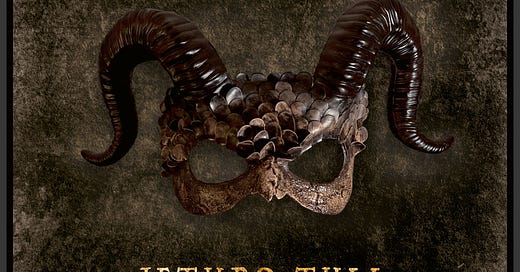Album Review: Curious Ruminant (Jethro Tull-2025)
The third album under the Jethro Tull banner to be released since 2022, Curious Ruminant is the latest creative project of Ian Anderson and co.
Anyone who has been following the band for some time knows that Ian's voice is not what it was, and is aware that Martin Barre is no longer a member of this new lineup (and hasn't been since the group's reformation in 2017). While Martin is very much missed, I personally have no issue with Ian's vocals on these new albums as his voice is chiefly a storytelling instrument. His delivery still adds character to the music and the nuances of his voice can be captured well in the studio. It's only when he plays live that the issues become serious, as he can no longer project his voice or hit the higher notes required for singing older material.
The album opens with 'Puppet and the Puppet Master', which, for my money, is a strong opening piece and the best track on the album. A piano intro by the impressively bearded John O'Hara opens the song before it kicks into full steam with the rest of the band led by Ian's flute. There are some strong guitar moments from new member Jack Clark which recall Barre's playing in their tone.
The title track, 'Curious Ruminant', follows, with more strong guitar and flute opening the piece. I remember being fairly underwhelmed by this piece when it was initially released as the album's lead single, and my opinion remains largely the same after subsequent listens. Ian's voice is barely above a whisper here and sounds frail. The melody is pleasant but doesn't have much power or energy to it.
'Dunsinane Hill' is a title that captured my attention when I first looked at the tracklist, but unfortunately it is a pretty forgettable number. One of the biggest problems I have with the songs is the overuse of the accordion. It is quite literally all over this album and it's about as distracting as those awful electronic drums on the Under Wraps album. Ian doesn't sing this one as much as merely speak the lyrics. 'The Tipu House' was the second single released from the album and I immediately liked this one much more than the title track. There's a good band performance here and the song reminds me a little of the material from Ian's 2003 solo album, Rupi's Dance.
The album continues with 'Savannah Of Paddington Green'. There's some nice acoustic guitar work on here, which is unfortunately overpowered by the accordion from the second verse onwards. 'Stygian Hand' is one of the best tracks on the album. Ian's vocals are strong here and there's a great energy that carries on throughout the track as it develops. Excellent playing by all the band. 'Over Jerusalem' continues the streak, featuring some thoughtful lyrics supported by a solid guitar backbone.
At 16 minutes and 41 seconds, 'Drink From The Same Well' is the longest track on the album, but ultimately fails to justify its running time, despite containing some fantastic flute parts which Ian himself has singled out as some of his all-time best playing. Which is just as well, as Ian's flute solo with some light accompaniment makes up the first 6 minutes of the piece. Ian's vocals finally come in at about 8 minutes in. The chorus and delivery of the repeated line "drink from the same well" work very effectively. There are some classic Anderson lyrics here too such as "displaying willful ignorance as to shifting tides of history". Overall, an interesting and memorable track. To this reviewer, good and maybe even very good, but not great.
'Interim Sleep' is a strange choice for an album closer and once again Anderson reverts to speaking rather than singing, reciting prose to a light accompaniment. Nice lyrics, but a rather lackluster ending.
Overall this is an interesting album with some strong moments, but not entirely satisfying in totality. I much prefer it to 2023's Rökflöte, but The Zealot Gene remains by far my favourite from these newer Tull releases. I don't think this is an album I need a physical copy of in my collection.
STAR RATING: 2.5/5




